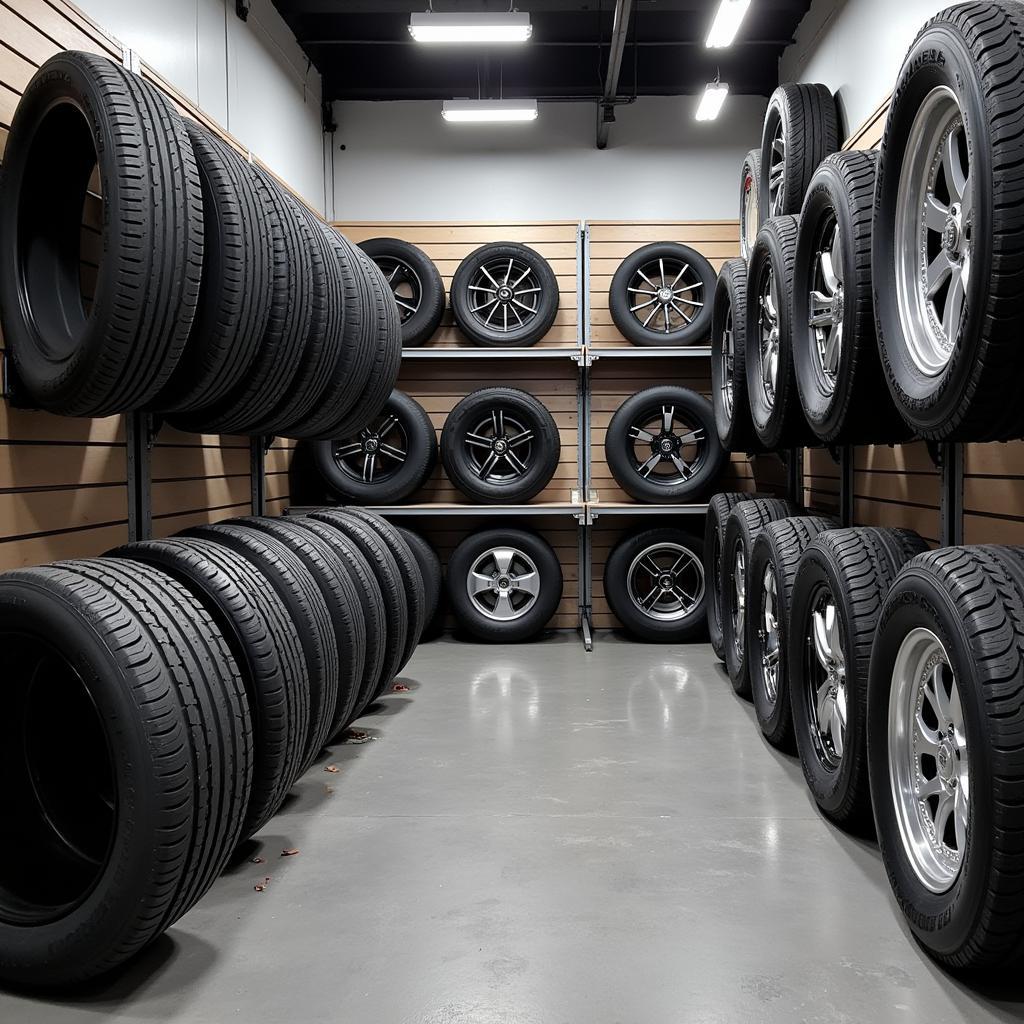Electric Car Tire Problems can leave you stranded and frustrated. Whether it’s unusual wear, decreased range, or a flat tire, understanding the unique challenges electric car tires face is crucial for a smooth and enjoyable ride. This guide will equip you with the knowledge to tackle common electric car tire issues and provide solutions for optimal tire maintenance.
The Weight Factor: How EVs Impact Tire Wear
One of the first things you’ll notice about electric cars is their weight. The battery packs that power these vehicles are significantly heavier than traditional gasoline engines. This extra weight puts added stress on tires, leading to potentially faster wear and tear. Don’t be surprised if your electric car tires need replacing sooner than those on your previous gas-powered vehicle.
Torque and Traction: A Balancing Act
Electric cars are known for their instant torque, which translates to rapid acceleration. While this is exhilarating for drivers, it can take a toll on tires. The increased force exerted on the tires during quick starts and stops can lead to increased wear, especially if you have a lead foot.
Rolling Resistance: Maximizing Your Range
A key factor influencing electric car range is rolling resistance. Tires with high rolling resistance require more energy to move, ultimately reducing the distance you can travel on a single charge. Electric car manufacturers often equip their vehicles with tires designed for low rolling resistance to maximize efficiency. These tires typically have specific tread patterns and rubber compounds optimized for reduced friction with the road surface.
Tire Pressure Matters: More Than Just MPGs
Maintaining the correct tire pressure is crucial for both traditional and electric vehicles, but it’s even more critical for EVs. Underinflated tires increase rolling resistance, directly impacting your electric car’s range. Overinflation, on the other hand, can lead to a harsher ride and premature wear on the center of the tire.
Pro Tip: Regularly check your tire pressure, especially during changes in temperature. You can find the recommended tire pressure for your electric car in your owner’s manual or on a sticker located on the driver’s side doorjamb.
Tire Types: Not All Tires Are Created Equal
When it’s time to replace your electric car tires, you might be tempted to just opt for the cheapest option. However, not all tires are created equal, and using the wrong type of tire on your EV can negatively impact its performance and efficiency.
Consider these factors when choosing replacement tires for your electric vehicle:
- Load Rating: Ensure the tires you choose have a load rating that can handle the weight of your electric car, including passengers and cargo.
- Speed Rating: While not as critical as load rating, selecting tires with an appropriate speed rating is important, especially if you frequently drive at higher speeds.
- Noise Level: Electric cars are remarkably quiet, and the right tires can help maintain that peaceful cabin environment.
- Tread Pattern: Different tread patterns offer varying levels of grip, handling, and noise reduction. Consider your driving habits and typical road conditions when making a selection.
 Selection of tires for electric vehicles in a tire shop
Selection of tires for electric vehicles in a tire shop
Common Electric Car Tire Problems and Solutions
1. Uneven Tire Wear: This can be caused by improper wheel alignment, worn suspension components, or even aggressive driving habits.
Solution: Schedule a wheel alignment check and have a mechanic inspect your suspension system for any issues.
2. Rapid Tire Wear: The added weight and torque of electric cars can accelerate tire wear.
Solution: Rotate your tires regularly according to your owner’s manual recommendations. Consider tires specifically designed for EVs, as these often feature more durable compounds to withstand increased stress.
3. Decreased Range: Underinflated tires and tires with high rolling resistance can significantly impact your electric car’s range.
Solution: Maintain proper tire pressure and choose tires with a low rolling resistance rating.
4. Increased Road Noise: Some electric car tires, especially those optimized for low rolling resistance, can be noisier than traditional tires.
Solution: Opt for tires that prioritize noise reduction, often featuring specialized tread patterns and noise-canceling technologies.
Expert Insights
“Many EV owners are surprised by the faster tire wear,” says John Smith, a seasoned automotive engineer with over 20 years of experience. “It’s crucial to be proactive about tire maintenance, rotating them regularly and opting for EV-specific tires when the time for replacement comes.”
“Don’t underestimate the impact of tire pressure on your range,” adds Smith. “A simple check every few weeks can significantly improve your driving efficiency.”
Conclusion
Understanding the unique demands placed on electric car tires is essential for maximizing your EV ownership experience. By being proactive about tire maintenance, choosing the right tires for your needs, and addressing problems promptly, you can ensure a smooth, efficient, and enjoyable ride for miles to come.
For personalized advice and assistance with electric car tire problems, contact AutoTipPro at +1 (641) 206-8880 or visit our office at 500 N St Mary’s St, San Antonio, TX 78205, United States. Our team of experts is dedicated to keeping your EV running smoothly.





Leave a Reply